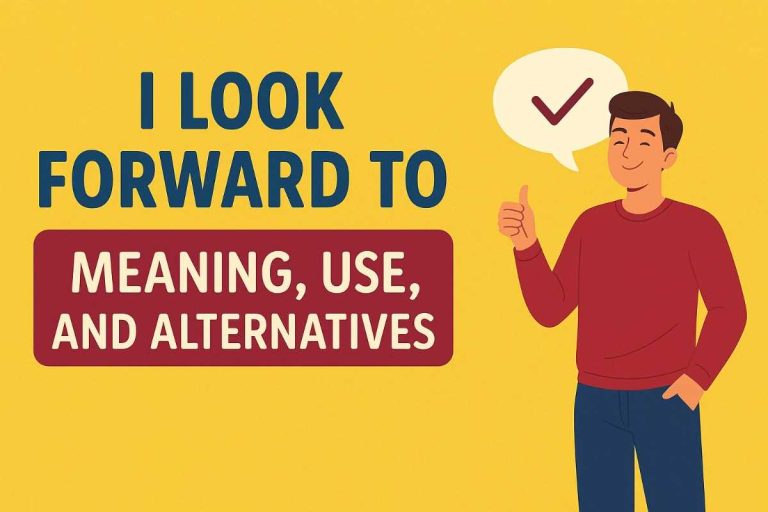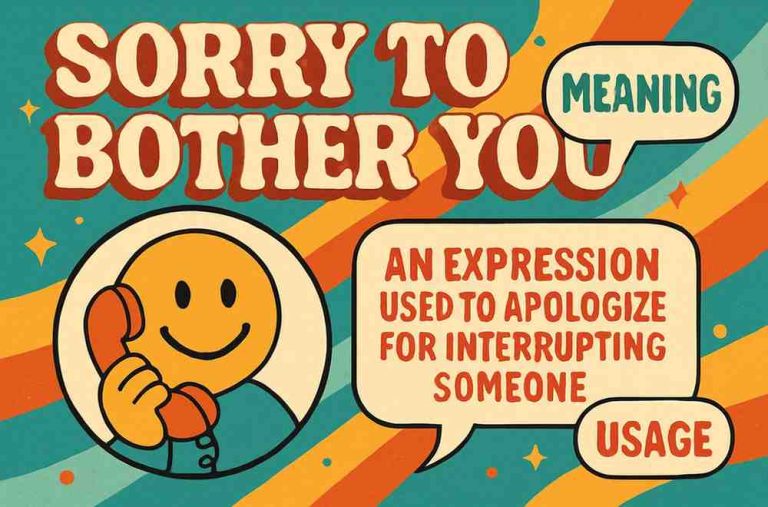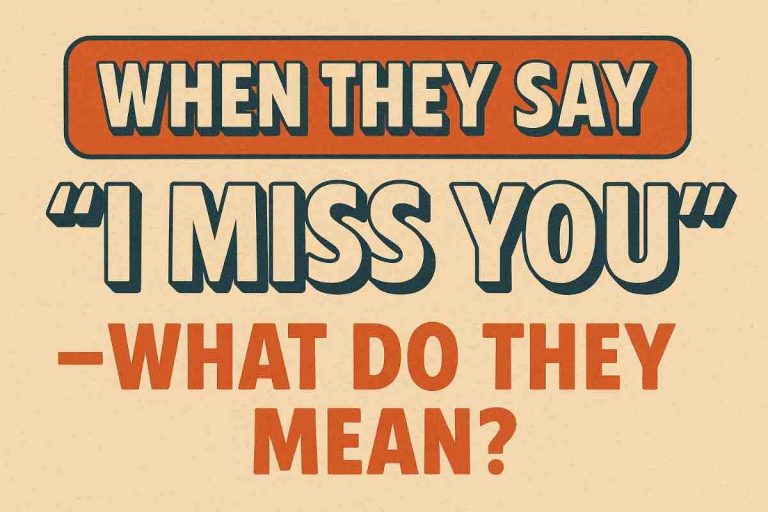20 Professional Alternatives to “Let Me Know If You Need Anything”
You’ve probably typed it a hundred times: “Let me know if you need anything.” It’s polite. It’s friendly. It’s also a little… generic.
While there’s nothing wrong with the phrase, it often ends up being a placeholder—something we say when we want to help but don’t know how to offer it clearly. Especially in professional settings, vague language like this can sound well-meaning but passive.
So if you want to step up your communication game—whether in emails, chats, or meetings—it helps to have a few sharper tools in your toolkit.
Let’s explore what this phrase really means, when it’s most useful, and 20 better alternatives you can use depending on the situation.
What Does “Let Me Know If You Need Anything” Mean?
At its core, this phrase is a catch-all offer of support. It’s a way to say, “I’m here for you,” without making assumptions.
It’s commonly used in work emails, during customer service interactions, or even when a colleague is going through a hard time. And that’s the thing—it can be helpful, but only if the recipient understands what kind of help you’re offering.
The problem? It puts the burden on the other person to figure that out.
When to Use “Let Me Know If You Need Anything”
The phrase works best when:
- You’ve already offered specific help and want to keep the door open.
- The situation doesn’t call for immediate or urgent action.
- You’re trying to sound polite, not pushy.
For example, after finishing a task for a teammate, you might say:
“The report’s uploaded to the shared drive. Let me know if you need anything else.”
Here, it’s a polite sign-off—not the only offer of help, but a way to signal you’re still available.
On the flip side, this phrase falls flat when you use it instead of offering real support. Imagine telling a stressed-out coworker, “Let me know if you need anything,” and walking away. What are they supposed to do—schedule a meeting just to ask for something you could’ve offered directly?
That’s where alternatives come in.
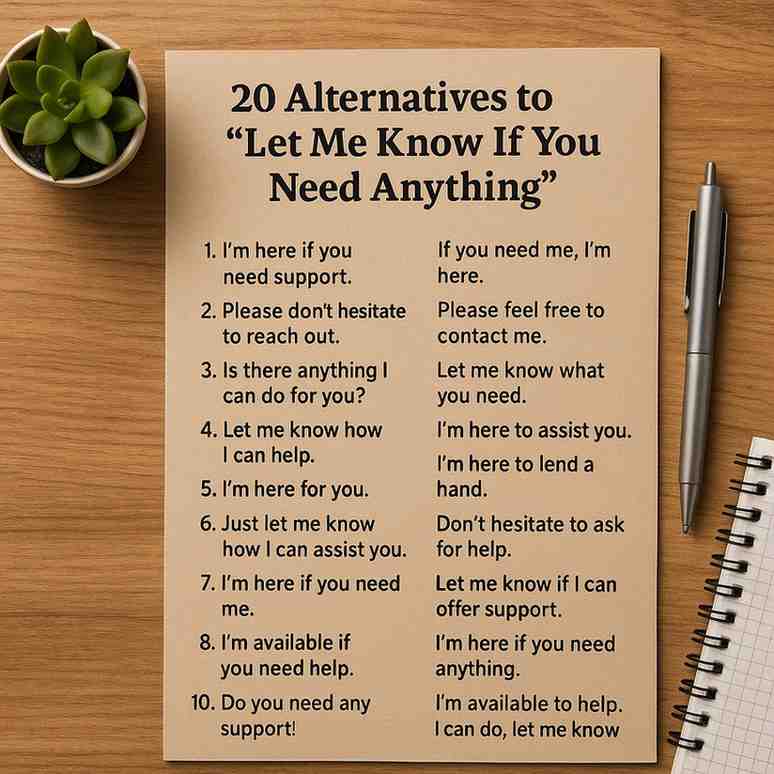
20 Professional Alternatives to “Let Me Know If You Need Anything”
Let’s break these down one by one with meaning, explanation, example, best use, and worst use—so you can decide which one fits your tone and context best.
1. I’m available if you need support.
Meaning: A soft but clear offer of help.
Explanation: Shows you’re open and willing without pressure.
Example: “I’ll be online until 6 PM—I’m available if you need support.”
Best Use: Remote work check-ins.
Worst Use: When urgent or time-sensitive support is needed.
2. Feel free to reach out with any questions.
Meaning: Encourages open communication.
Explanation: Invites dialogue, especially helpful for new clients or employees.
Example: “Welcome to the team! Feel free to reach out with any questions.”
Best Use: Onboarding, project handoffs.
Worst Use: After delivering bad news—it may sound too casual.
3. Is there anything I can take off your plate?
Meaning: Direct offer to reduce their workload.
Explanation: Shows initiative and empathy.
Example: “I know it’s a busy week—anything I can take off your plate?”
Best Use: Team collaboration.
Worst Use: Hierarchical settings where offering help might feel inappropriate.
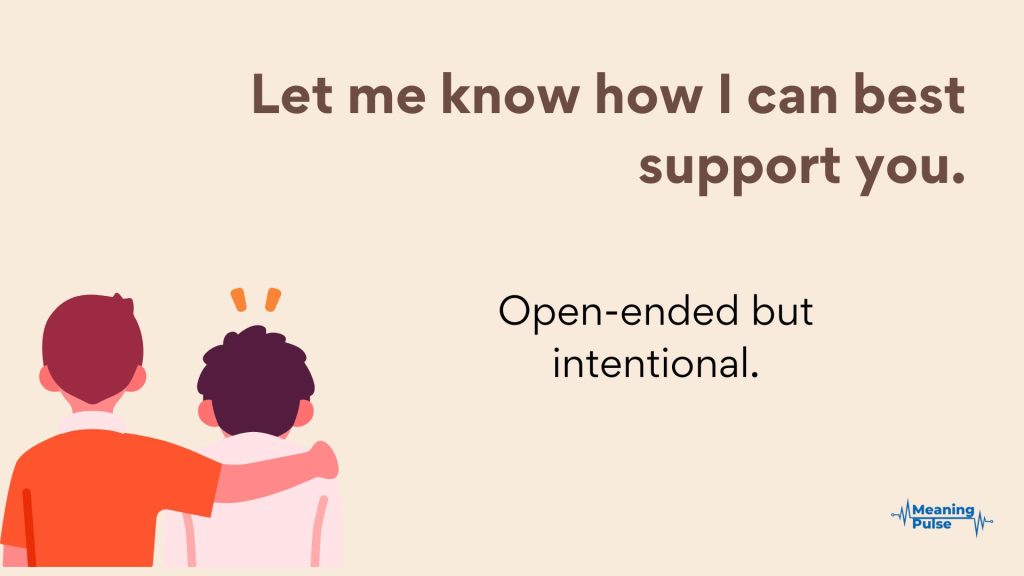
4. Let me know how I can best support you.
Meaning: Open-ended but intentional.
Explanation: Puts the focus on the other person’s needs.
Example: “I understand this is a big project. Let me know how I can best support you.”
Best Use: Leadership, coaching.
Worst Use: Casual exchanges—it may feel too formal.
5. I’m happy to help with [specific task].
Meaning: Concrete, task-based offer.
Explanation: Offers specific assistance without being overbearing.
Example: “I’m happy to help with formatting the deck, if that would be useful.”
Best Use: Project-based teamwork.
Worst Use: Emotional or sensitive conversations.
6. Would it help if I [action]?
Meaning: Suggests something tangible you can do.
Explanation: Makes it easier for someone to accept help.
Example: “Would it help if I handled the follow-up emails?”
Best Use: Fast-moving projects, meetings.
Worst Use: When you’re not actually available to do the work.
7. Don’t hesitate to ask.
Meaning: Classic and polite.
Explanation: Encourages people to speak up, even for small things.
Example: “I’ll be around all day—don’t hesitate to ask.”
Best Use: General support tone.
Worst Use: When paired with vague or delayed communication.
8. If anything’s unclear, I’m happy to clarify.
Meaning: You’re ready to explain.
Explanation: Reduces confusion and builds trust.
Example: “If anything’s unclear in the brief, I’m happy to clarify.”
Best Use: Instructions, documentation.
Worst Use: Emotional support moments.
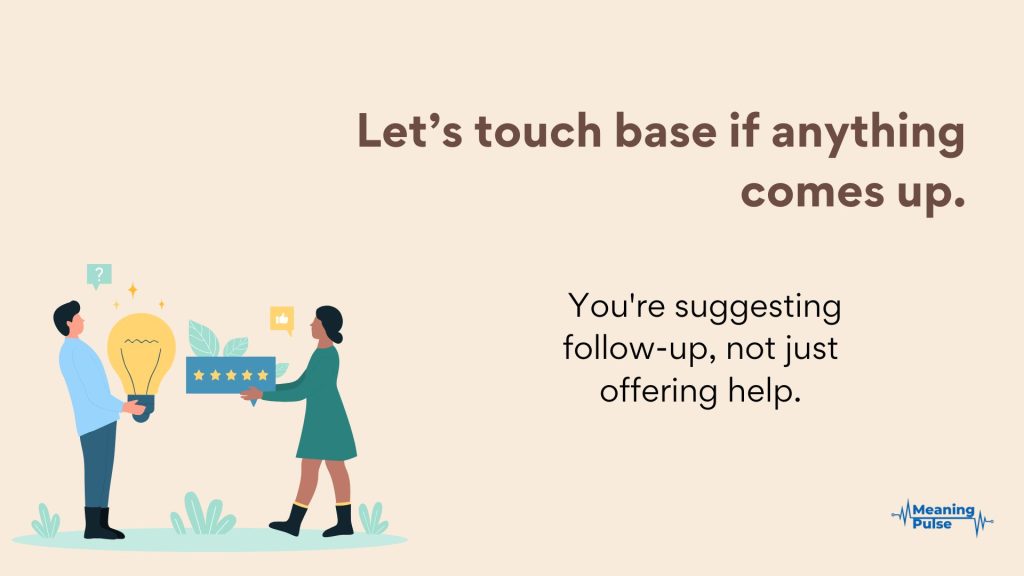
Check This Out: 26 Alternatives to ‘Please Feel Free’ for Better Email and Copywriting
9. Let’s touch base if anything comes up.
Meaning: You’re suggesting follow-up, not just offering help.
Explanation: Keeps the door open for future communication.
Example: “Let’s touch base if anything comes up during testing.”
Best Use: Project timelines.
Worst Use: One-off tasks that don’t need more discussion.
10. Just say the word—I’ve got you.
Meaning: Friendly and reassuring.
Explanation: Good for colleagues you know well.
Example: “Need a second pair of eyes? Just say the word—I’ve got you.”
Best Use: Informal teams.
Worst Use: Formal settings or first-time clients.
11. I’ll check back with you soon.
Meaning: You’re taking initiative to follow up.
Explanation: Reduces pressure on the other person to respond.
Example: “I’ll check back with you soon to see how things are going.”
Best Use: Supportive leadership.
Worst Use: Situations that don’t require a follow-up.
12. Ping me if you need anything.
Meaning: Super casual.
Explanation: Friendly shorthand used in many digital workplaces.
Example: “I’ll be in the Slack channel—ping me if you need anything.”
Best Use: Team chats.
Worst Use: External communication or formal emails.
13. Let me know what would be most helpful right now.
Meaning: Encourages direct feedback.
Explanation: Opens space for prioritization.
Example: “This seems stressful—let me know what would be most helpful right now.”
Best Use: High-pressure scenarios.
Worst Use: Low-effort check-ins.
14. I’m here if you want to talk.
Meaning: Emotional support, not just task help.
Explanation: Important for personal and sensitive moments.
Example: “Take your time—I’m here if you want to talk.”
Best Use: Difficult personal moments.
Worst Use: Business-only communication.
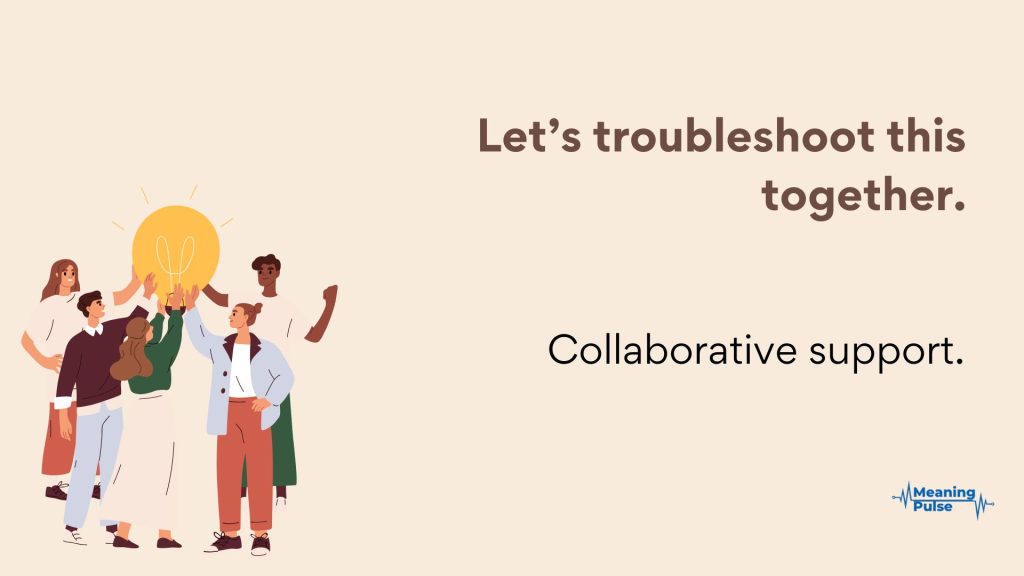
Find Out More: 25 Kind Ways to Say ‘God Bless You’ Without Sounding Too Formal
15. Let’s troubleshoot this together.
Meaning: Collaborative support.
Explanation: Great for problem-solving and brainstorming.
Example: “Running into snags? Let’s troubleshoot this together.”
Best Use: Tech or creative work.
Worst Use: When help isn’t needed.
16. I’ll handle this part—let me know what you need from me.
Meaning: You’re taking the lead but still flexible.
Explanation: Shows ownership and openness.
Example: “I’ll handle the data—let me know what you need from me.”
Best Use: Shared responsibilities.
Worst Use: Independent projects.
17. Shoot me a note if anything pops up.
Meaning: Friendly, non-intrusive.
Explanation: Encourages casual communication.
Example: “Shoot me a note if anything pops up before the meeting.”
Best Use: Slack or email messages.
Worst Use: Serious or high-stakes issues.
18. I’m all ears.
Meaning: You’re ready to listen.
Explanation: Great for creating space for honest feedback.
Example: “If you want to talk through the pitch—I’m all ears.”
Best Use: Peer-to-peer conversations.
Worst Use: Formal settings.
19. Let’s schedule time if you’d like to talk it through.
Meaning: Offers structured support.
Explanation: Better than a vague “let me know.”
Example: “Let’s schedule time if you’d like to talk it through.”
Best Use: Detailed or sensitive topics.
Worst Use: Low-effort check-ins.
20. I’ve added a few resources—you might find them helpful.
Meaning: You’re offering value proactively.
Explanation: Shows thoughtfulness and initiative.
Example: “I’ve added a few resources—you might find them helpful as you prep.”
Best Use: Mentorship, onboarding.
Worst Use: When someone hasn’t asked for advice.
Simple and Polite Responses to “Let Me Know If You Need Anything”
Sometimes, you’re the one on the receiving end of this phrase. Not sure how to reply?
Try these quick responses depending on your context:
- “Thanks, I appreciate it. I’ll let you know.”
(Classic and polite.) - “Actually, yes—could you [insert task]?”
(If you need something specific.) - “All good for now, but I’ll reach out if anything comes up.”
(Keeps the door open.) - “Thanks for offering. I’ll circle back if I need help.”
(Shows gratitude and professionalism.)
Conclusion
“Let me know if you need anything” isn’t going away—and honestly, it doesn’t need to. It’s a polite, professional catch-all. But if you’re looking to be more helpful, clear, and supportive? Swap it out for something with a little more intention.
The key isn’t about sounding clever—it’s about making life easier for the person on the other side of your message.
Whether you’re managing a team, working with clients, or just trying to be a more thoughtful coworker, these alternatives will help you sound more present—and more human.




